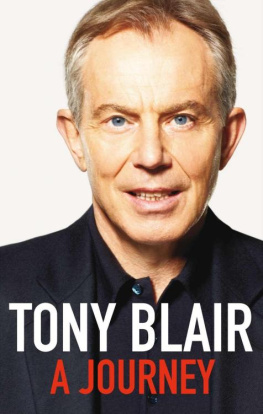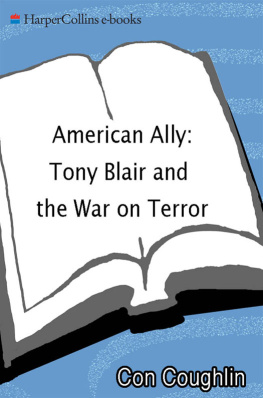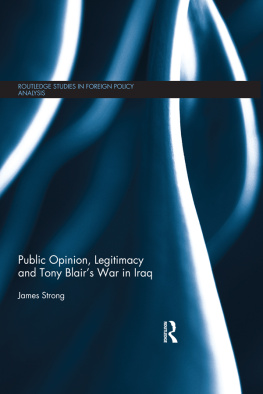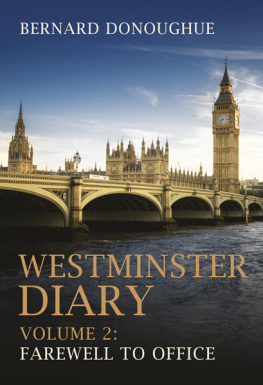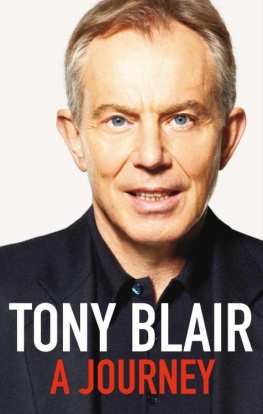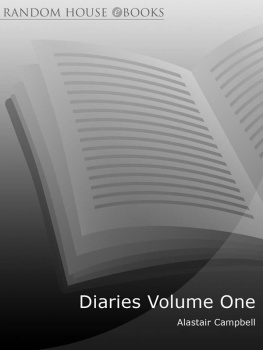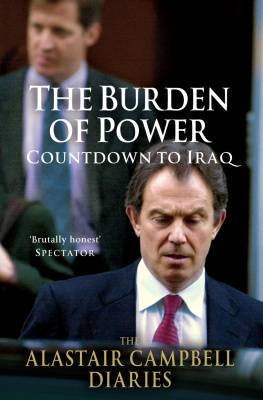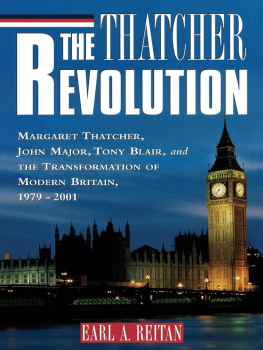Tony Blair - A Journey: My Political Life
Here you can read online Tony Blair - A Journey: My Political Life full text of the book (entire story) in english for free. Download pdf and epub, get meaning, cover and reviews about this ebook. year: 2010, publisher: Alfred A. Knopf, genre: Politics. Description of the work, (preface) as well as reviews are available. Best literature library LitArk.com created for fans of good reading and offers a wide selection of genres:
Romance novel
Science fiction
Adventure
Detective
Science
History
Home and family
Prose
Art
Politics
Computer
Non-fiction
Religion
Business
Children
Humor
Choose a favorite category and find really read worthwhile books. Enjoy immersion in the world of imagination, feel the emotions of the characters or learn something new for yourself, make an fascinating discovery.

- Book:A Journey: My Political Life
- Author:
- Publisher:Alfred A. Knopf
- Genre:
- Year:2010
- Rating:5 / 5
- Favourites:Add to favourites
- Your mark:
- 100
- 1
- 2
- 3
- 4
- 5
A Journey: My Political Life: summary, description and annotation
We offer to read an annotation, description, summary or preface (depends on what the author of the book "A Journey: My Political Life" wrote himself). If you haven't found the necessary information about the book — write in the comments, we will try to find it.
A Journey: My Political Life — read online for free the complete book (whole text) full work
Below is the text of the book, divided by pages. System saving the place of the last page read, allows you to conveniently read the book "A Journey: My Political Life" online for free, without having to search again every time where you left off. Put a bookmark, and you can go to the page where you finished reading at any time.
Font size:
Interval:
Bookmark:



ALFRED A. KNOPF
NEW YORK TORONTO 2010
O n 2 May 1997, I walked into Downing Street as prime minister for the first time. I had never held office, not even as the most junior of junior ministers. It was my first and only job in government.
The election night of 1 May had passed in a riot of celebration, exhilaration and expectation. History was not so much being made as jumping up and down and dancing. Eighteen years of Conservative government had ended. LabourNew Labourhad won by a landslide. It felt as if a fresh era was beginning. As I walked through the iron gates into Downing Street, and as the crowdcarefully assembled, carefully managedpressed forward in enthusiasm, despite the setting, the managing and the fatigue of being up all night, I could feel the emotion like a charge. It ran not just through the crowd but through the country. It affected everyone, lifting them up, giving them hope, making them believe all things were possible, that by the very act of election and the spirit surrounding it, the world could be changed.
Everyone except for me, that is. My predominant feeling was fear, and of a sort unlike anything I had felt before, deeper even than the fear I had felt the day I knew I was going to take over the leadership of the Labour Party. Until election night, this fear had been kept in check by the routine, rigour and sheer physical and mental exertion of the campaign. Also, campaigning was familiar emotional as well as political territory. I had a strategy for guiding us from Opposition into government; I adhered to it, and I knew if I did so, I wouldnt fail. I had redefined the Labour Party as New Labour, a changed progressive force in British politics; I had set out an outline programme of sufficient substance to be credible but lacking in the details that would have allowed our opponents to damn it; and I had fashioned a strong but believable attack on the government, and assembled a ferociously effective election-fighting machine.
In order to instil discipline, into the party and even my close team, I was the eternal warrior against complacency. I regularly spoke about how big opinion-poll leads could be lost, how the Tories should never be underestimated, how we had this problem and that challenge. Since we had lost four elections in a row and had never won two consecutive full terms, I was cultivating fairly fertile ground. The party had almost come to believe that it couldnt win, that for some divine or satanic reason, Labour wasnt allowed an election victory no matter what it did. For some, it was like the old football adage: a game played with a round ball, two teams of eleven players, forty-five minutes in each half and the Germans always win.
I thought that was complete baloney. We had lost because we were out of touch with the modern voter in the modern world. The first rule in politics is that there are no rules, at least not in the sense of inevitable defeats or inevitable victories. If you have the right policy and the right strategy, you always have a chance of winning. Without them, you can lose no matter how certain the victory seems.
Pretending that it was all really on a knife-edge helped motivate, galvanise and keep us in line. Though underneath I was very confident, you never know. Whats more, I believed the current prime minister John Major was much better than most others thought. He had real appeal as a person. Fortunately, his party had gone off the rails, to a heavy, hard-right position, and over the seemingly interminable time I had spent as Leader of the Oppositionalmost three yearsI had learned how to play him and his party off against each other.
Major had decided on a long campaign of three months (its usually less than a month). It was tough, of course, but it wasnt an uncharted landscape and it fitted a pattern. The hope was that we would trip up, I would suddenly lose my head, by some trick of fate or fortune the mood of the public would switch. It was never really going to happen.
Instead, and rather more predictably, the Tories fell apart. Every time Major tried to get them on the front foot, someone in his ranks resigned, said something stupid, got caught in a scandal and frequently all three at once and occasionally the same person. It was like watching a slow-motion suicide or an escape artist who ties concrete blocks to his legs, puts on handcuffs, gets in a lead box, has it sealed and jumps into deep water. You think, hows he going to get out of that?and then you realise he isnt. Amazing how a political party can go like that, though it is possible to tempt them to it if their opponents are smart enough; and by occupying the centre ground, make them foolishly go off to the side.
So the election campaign was long, enervatingas they always arefull of phoney ups and downs, shock polls and startling happenings, but in the end the result was obvious. The scale of the victory, however, was not clear. I had an inkling. If I had had to bet on it, I would have bet big. On the night of 1 May it became clear just how big. And that was when the fear started to set in.
The actual day of the election had passed uneventfully, as they do. Campaigning stops. You go to vote. I walked out of our constituency home in Trimdon Colliery, an old mining village near Sedgefield in County Durham where I had been MP serving the local constituency for fourteen years. The mine had been a casualty of the closure policy of the 1960s, which had been set out by the National Coal Board and the government to concentrate coal production at the most highly productive mines. I strode to the polling station with Cherie and the children, the ideal family picture, while a horde of snappers took our photograph. Smile, but not exuberantly. Talk, but not with too much animation. Look natural, as if you would naturally walk hand in hand with your wife, in suit trousers, shirt and tie, with your children in tow, to vote in a makeshift wooden polling booth and claim your place in history.
Then back home. I had waited on election day three times beforein 1983, 1987 and 1992for the defeat I thought would come. I had wondered what it would mean for me, how I would position myself for the next bout of Opposition, how and whether I would ever get the chance to help steer us from the path of defeat. This time, all eyes were focused on me as I travelled the last steps of the path to victory. Anxiety displaces all other emotions. You cant settle. I tried to concentrate on choosing a Cabinet, and phoned Gordon Brown, then Shadow Chief Secretary, and Peter Mandelson, who was in charge of strategy. (The Shadow Cabinet is of course made up of a group of senior MPs who are in Opposition and who shadow their equivalents in the ruling government.) John Prescott came up from Hull to talk through the Cabinet. I spoke incessantly to Philip Gould, our chief pollster, and party staff about the prospects of the majority, but all really to pass the time. Even then, the enormity of what was about to happen didnt really sink in.
But it did by the time we got to the count, just after midnight, in the cavernous indoor sports centre at Newton Aycliffe, a town in County Durham in my former constituency of Sedgefield. The exit polls had shown big leads. They might be out a fraction, but there was no way they were going to be that wrong. We were going to win. I was going to be prime minister. During the course of the evening, my psyche shifted as the results came in. Of course the journeys end had always been changing the country, but in the intense struggle to get to the point where that could be achieved, every waking moment had been bent to eliminating the challenges, making sure the vehicle was fit for the voyage, the engine sparking, the passengers either on board or shouting impatiently from behind us, not barring the way ahead. To be sure, we conducted genuine and in-depth discussions to map out how we would navigate the new terrain of government once past the post; but living in the moment, it was the business of Oppositionwhich we were adept at and had been practising these long years in the wildernessthat dominated our thinking. Our intellectual and rational attention was drawn to the processes of government as the day came nearer, but our emotional core was still directed at getting there.
Font size:
Interval:
Bookmark:
Similar books «A Journey: My Political Life»
Look at similar books to A Journey: My Political Life. We have selected literature similar in name and meaning in the hope of providing readers with more options to find new, interesting, not yet read works.
Discussion, reviews of the book A Journey: My Political Life and just readers' own opinions. Leave your comments, write what you think about the work, its meaning or the main characters. Specify what exactly you liked and what you didn't like, and why you think so.

